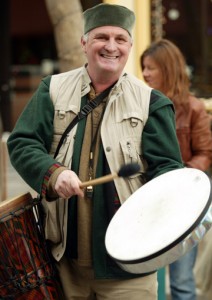Rhythmical Alchemy Playshop
Thursday November 6, 2014
1:30pm-6:30pm
With
Arthur Hull
What will you be sharing?
In the “Rhythmical Alchemy Playshop” Arthur will teach a number of Drum Circle games and rhythm activities that can be adapted and applied to many different populations and age groups.
What is your experience with this topic?
Known as the father of the facilitated drum circle movement, Arthur has been facilitating rhythm-based events for almost 30 years in many populations (previous AMTA conferences, personal growth institutions, corporate trainings, teacher trainings, Health Rhythms-style trainings). Arthur has taught over 10,000 people in over 22 countries how to facilitate drum circles and rhythm-based events. In this period, he has done Rhythmical Alchemy Playshops throughout the world, which consists entirely of drum circle and interactive rhythm-based games.
Where will attendees be able to implement the information you share?
These drum circle games can be implemented with any group of people. They can easily be adapted to meet the needs of the constituency for which the attendee serves, including music therapy environments, schools, public gatherings, special needs environments and corporate trainings.
Tell us something that makes your CMTE unique or different.
Drum Circles games are just plain fun! At the same time, they can deliver activities and metaphors that address any particular group’s needs. Synergy-building, community-building, stress-relief, strengthening awareness and attention, are automatically built in to any Drum Circle event activity. Clinical applications can then be easily adapted into these activities.
Why is this topic of interest to you?
Rhythm expression is what Arthur Hull has been doing since his third trimester in his mother’s womb. He was born for this, and his mother was happy to have him out and into to the world. Rhythm expression is one of the most accessible creative music-making available to anyone regardless of their rhythm expertise. It has been Arthur’s experience that facilitating rhythm expression can be used in situations from prenatal to hospice.
Who should attend your class?
If you have read all the answers above, you can see that rhythm-based events can be used by any professional who is serving community and wants to take the tools offered by Arthur into their constituency that they are serving.
What kind of information will attendees be walking away with?
They will walk away with a bag of rhythm tricks and drum circles games that can excite and engage any group activity, and at the same time, deliver their professional bottom-line purpose.




